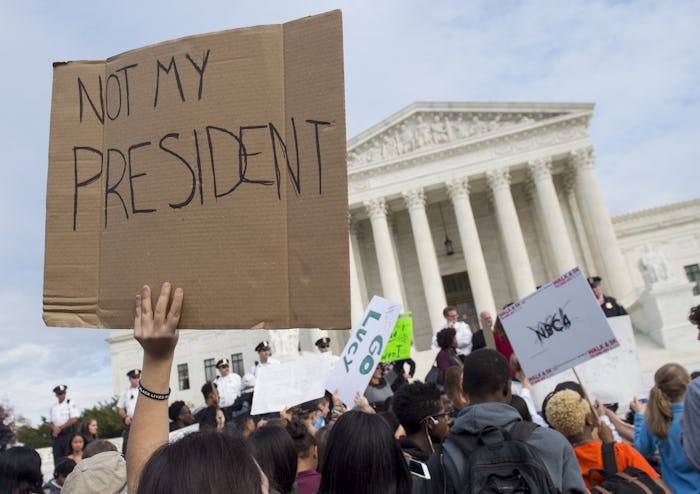News

5 Reasons To End The Electoral College, Because It Truly Affects Everyone
States looking to lessen the gap between their own votes and the national popular vote have pointed to the National Popular Vote Interstate Compact as a solution. Adopting the Compact means that all of a state's votes would be counted in accordance with how the national popular vote shakes out. This effort comes as a response to some of the many reasons to end the Electoral College. With Hillary Clinton winning the popular vote by more than 2.8 million, it seems, at the very least, incongruous that these winning numbers would translate to a mere 232 electoral votes against President-elect Donald Trump's 306 electoral votes.
Even if the whole "faithless" or "Hamilton" electors thing doesn't work out, the Compact still wouldn't be this election's solution. Think of it more as a preventative measure should a future national and state vote yield a similar discrepancy. The Compact requires 270 electoral votes from supportive states in order to be passed. As of now, it has 10 states and the District of Columbia, totaling 165 electoral votes.
Whereas the Compact couldn't stop a Trump presidency this time around, it could abolish the Electoral College — an institution that, to so many, feels like an obstruction of democracy rather than a defense of it. Below are five important reasons as to why the Electoral College should be ended.
1Though It Appears Bipartisan Now, It Affects Both Parties
Whereas it's true that, in 2000, Al Gore won the popular vote but not the presidency, the Electoral College doesn't necessarily always favor Republicans and hurt Democrats. Nate Silver reminds: "There’s almost no correlation between which party has the Electoral College advantage in one election and which has it four years later." Thus, ending it altogether might be the fairer, long-term solution.
2It Prioritizes Swing States, Forgetting Others
If candidates aimed for the popular vote, then the breadth of their campaigning would likely expand. Due to the need to secure high-value votes, though, certain states are prioritized. Therefore, the Electoral College "tilts the playing field in favor of candidates who appeal to low-population states and a small set of contested 'swing' states, rather than those who appeal to big urban centers in population-rich states that are not contested."
3It Negates "One Person, One Vote"
Seeing that electoral votes are dictated by how many members of Congress each state has, actual population counts are all but irrelevant. Thus, less populous states are given more electoral weight. If you're voting in Wyoming, North Dakota, or Vermont, your vote is much stronger than if were voting in New York, Florida, or California. This gives some votes a much higher value than others.
4It's History Is Entrenched In Slavery
The formation of the Electoral College has a tainted past. "Southern delegates to the 1787 Constitutional Convention...were concerned that their constituents would be outnumbered by Northerners. The Three-Fifths Compromise, however, allowed states to count each slave as three-fifths of a person — enough, at the time, to ensure a Southern majority in presidential races," reminds The New York Times. Thus, the system was actually established to disenfranchise non-white voices, suppressing them.
5Even Trump Finds Fault With It
Responding to the 2012 election, Trump went on a tweet-storm to criticize the Electoral College, calling it an "injustice" and saying that, because of it, "We are not a democracy!" For once, he might have been making some sense.